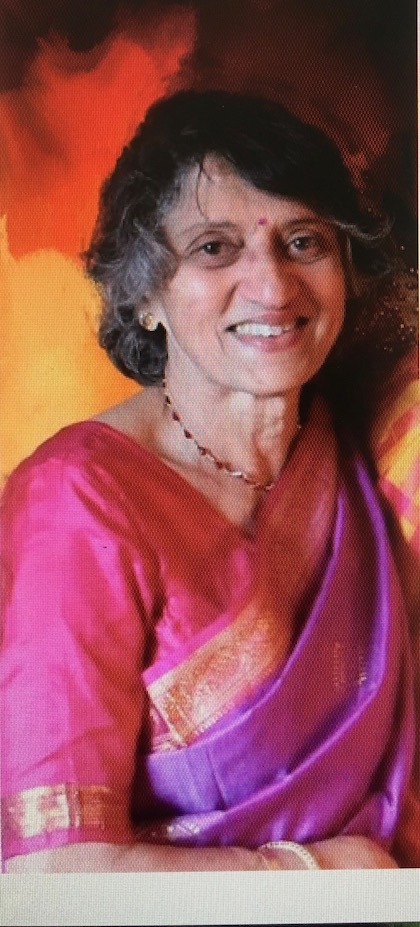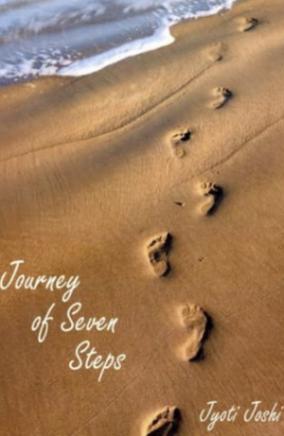Contribute
| In Conversation With Jyoti Joshi |
Shuchita Rao
01/13/2022
Jyoti Joshi’s recently written, moving memoir ‘A Journey of Seven Steps’ describes her journey with her husband, the late Dr. Madhukar Joshi, a brilliant Statistics professor, from the time she was introduced to him as a prospective bride in India in 1967 to the day after his death in 2014, when his life was celebrated with friends and family in a beautiful church in Norton, MA.
The late Dr. Madhukar Joshi did his Ph.D in Statistics from Case Western Reserve University, taught at Brandeis and UMass universities and also worked for MITRE, Digital Equipment Corporation, Unitrode and Texas Instruments. He retired in 2006. He was diagnosed with Alzheimer’s disease during the last few years of his life. Jyoti who was an artist and teacher by profession, became her husband’s primary caregiver. Their two daughters Swati and Chitra, born and raised in United States, also pitched in to help with caregiving responsibilities.
In Alzheimer’s disease, a patient’s brain dies slowly and the patient changes both physically and mentally. Eventually, the patient becomes less aware of themselves and forgets who their loved ones are. It becomes extremely difficult for the family and friends of the patient to take this transformation in their stride. Dr. Joshi spent the last few months of his life at a nursing home. The memoir ‘A Journey of Seven Steps’ describes Jyoti’s journey from the time of her marriage through the challenging phases of diagnosis and treatment of her husband’s Alzheimer’s disease until his demise in 2014.
Jyoti Joshi is a sensitive artist and published author who graduated from the reputed Sir JJ School of Art in Mumbai, India. During her time at Sir JJ School of Art, Jyoti was actively painting and sketching about a hundred sketches a day. Like her colorful and evocative paintings, Jyoti’s 389 page memoir replete with poetic quotations and vivid imagery, carries its readers through the emotions of happiness, anger, grief, fear, courage, surprise and remorse. The book is available for purchase on Amazon and Kindle.
Lokvani spoke to Jyoti Joshi about her book.
Q. Is this your very first book or have you published other books?
A. This is actually my third book. My first two books, “Patjhad†and “Saat Paavlaancha Pravaas†were in the Marathi language. “A Journey of Seven Steps†is my third book and it is an English translation of my Marathi book “Saat Paavlancha Pravaas†which is an account of my marital journey that started with the seven steps I took with my husband around Agni (Fire God), the late Dr. Madhukar Joshi during our marriage in 1967.
Q. Did someone help you translate the book from Marathi into English and also help with editing it?
A. I translated the book into English. My daughters Swati Joshi and Chitra Baylis (who were born and raised in the United States) helped edit the book.
Q. How did you get the idea to write and publish the memoir, ‘A Journey of Seven Steps’?
A. A few things propelled me to write the memoir. The first was that I have had a lifelong habit of writing a diary. It is usually an account of what I did during the day, my interactions with people and any interesting things that I encountered during the day - such as a poem I read or something interesting that I witnessed. One day I thought to myself “What if I lose my memory? What if my daughters were to go through what I did when I learned that my husband was suffering from Alzheimer’s disease?†I thought of people other than family who may be taking care of someone with Alzheimer’s and felt that my experience if written in the form of a book, may become a lantern for them. My diary writing habit helped with putting the book together.
Second, one of my high school teachers from 1962 was like a father figure to me. I used to call him occasionally on the phone and read to him some of my written work. He always used to encourage me to write about my experiences in America. He asked me to think about writing and publishing a memoir. Third, a friend came with her husband to visit me a few years back. I told them that I was in the habit of writing down my experiences in a diary. When my friend’s husband read what I wrote, he started crying. He told me that he could experience ‘navarasas†(nine emotions) through my written work. That was the starting point to my taking up the task of writing the book as a serious project. I also want to mention that my family back in India and also my husband and daughters were always encouraging of my writing talent and urged me to publish my work.
Q. What did you find difficult about converting notes in your diary into a memoir?
A. To be honest, it was not tough because the book is based on real-life experience or a true story. I dated everything I wrote down in my diary. My journey with my husband Madhukar started with my marriage to him, with him holding my hand and walking seven steps around a fire pit signifying God Agni. He led the first few steps and I followed him. Then, I held his hand for the next three steps and he followed me. The story unfolded naturally and so did the sequence of chapters in the book. What was difficult was re-living the entire journey when I converted the notes in my diary into a book.
Q. You have lived in the US for over five decades now. Has that changed your perception of Indian values and culture in any way?
A. When I was studying at Sir JJ School of Art, my classmates and I would sit around a large banyan tree where the renowned thinker and philosopher, Jiddu Krishnamoorthy, was invited to give lectures. I listened to him in fascination. I was born and raised in a household where there was a lot of importance given to spirituality. My parents and I regularly attended lectures on the Bhagvad Gita. My father was somewhat ritualistic and my mother had a practical bent of mind. She was a logical person. She explained to me the reason behind many rituals. For instance, in India, in many households (such as mine), young women are asked to sit outside the house during their period and not touch anything. When I had my period, I hated this ritual because my brothers knew why I was asked to sit outside. My mother explained to me that those few days were meant to provide a vacation to the woman, who was always busy otherwise doing things within the house. Another thing that happens in India is that during proposed/arranged marriages, some parents will simply tell their offspring “Here is the person you will be marrying.†I questioned such things. When my marriage alliance was being arranged with Madhukar, I wondered if he was really interested in marrying me or whether he was blindly following a suggestion from his family. It was only when Madhukar assured me that he liked me that I agreed to the marriage.
When my two daughters were born in America, I started examining and appreciating Indian values beyond what I had seen in India. I studied Advaita, Yoga and Vedanta once again, so that I could teach my daughters properly.
Q. How did you as a family face the reality of your husband becoming a patient of Alzheimer’s disease? Were your daughters able to help you with caregiving responsibilities for your husband?
A. One thinks that one gives birth to a child, but the Bhagvad Gita says “ Your children choose you as their parent.†I am very fortunate to have two caring daughters, Swati and Chitra. They are my jewels. I was honest with them from the day their father was diagnosed with Alzheimer’s disease. However, I did not want to burden them with caregiving responsibilities in any way. I did not want them to babysit their father. But, they asked to do so. They would come home and look after him and ask me to use the time to relax. “Mummy – this is your free time. Please do anything you like during this time.†they would insist.
It was my daughters who urged me to translate my Marathi book into English. I hesitated to do so because I did not want to live through the experience again. They felt that others could benefit from reading about our experience in caring for Madhukar. I tend to write in flowery language and they felt that editing the translated language may help make it suitable for a diverse population of readers. They edited the book and helped with the marketing aspect.
Q. What kind of response have you received thus far for your book?
A. The English book has been very successful. Some people stop me when they see me and tell me that they read my book and liked it. A few Indian senior citizen associations have shared my book in their groups. I want to advise caregivers of Alzheimer’s patients to take time for themselves because if they fall sick, they will not be able to take care of the patient. My hope is that caregivers will learn something from my experience and that my book will be serve as a lantern for them.
Q. It has been nearly eight years since Dr. Joshi passed away. What has helped you heal from the difficult moments of your past?
A. The wound has healed but sometimes the scab peels and I feel very sad. On such days, I tell myself “No matter how much you cry, he will not come back. Take one foot after another.†At first, I thought I would volunteer at the same nursing home where Madhukar spent the last phase of his life. However, I would start crying if I tried driving to the nursing home. My daughters asked me to save myself from that torture. I therefore, now, try to help caregivers within my own community. I also write and paint when I can.
Q. Are you currently working on any new creative project?
A. I am currently working on a book on Rumi’s poems. I had done some translation of Rumi’s poems into Marathi almost 25 years ago, when he was not that well known. I have taken up that project once again. Whenever I engage in creative work, I feel that someone else is doing the actual work. I am just a medium through which it is created.
You may also access this article through our web-site http://www.lokvani.com/

